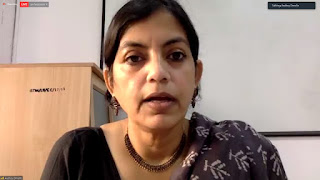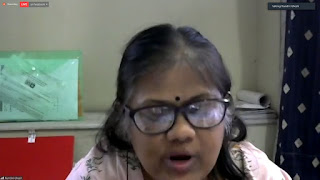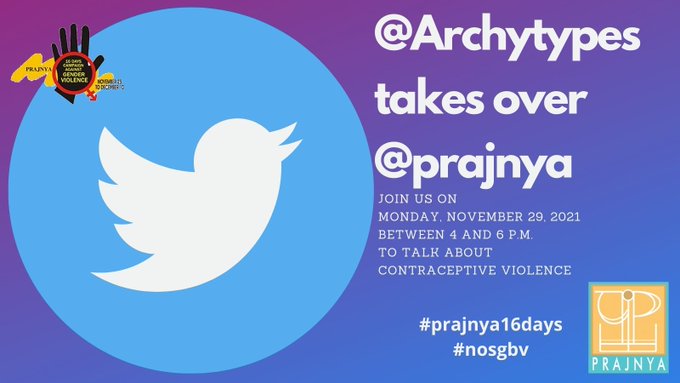The final day of the Prajnya 16 Days Campaign Against Gender Violence was on Regional Perspectives on Honour, Violence and Women's Rights: A Panel Discussion. We closed with a panel that depicted how violence in the name of 'honour' transgresses borders. Here, pride takes the front seat, thereby justifying gruesome killings, often with the support of the state's machinery.
Our facilitator of the session, Kiran Moghe, opened with how "the question of women's honour is tied up with the community and she represents the community/ collective honour, which has a bearing on her everyday life; she is subject to several kinds of restrictions on her basic freedom and on her basic right to life. These are very fundamental questions related to our existence as women."
Our first speaker, Jagmati Sangwan addressed the manner in which the state and its units have failed to address the brutality that is honour crimes, with a focus on the ground realities in Haryana.- "Usually common people around us take honour killings and honour crime as due to generational gap of ideas, parents losing control over their sons and daughters-in-law But our experience is that there has been a whole political economy attached to this issue. The political economy is to maintain the hierarchical social structures and cultural norms in the society. The control of female sexuality is crucial in patriarchal setups and hegemonic societies. If the women exert their choice in the issue of marriage, there is a seed of formation of an egalitarian society coming into existence as a result of these marriages. This concern, we feel, has been given the name of honour to control the sexuality of women. This is the crux of this issue."
- "The major distortions made here to punish these couples is by tampering the birth certificate and showing the couple as underage, and registering cases of kidnap and rape against boys. The human rights protection agencies have delayed and ineffective responses. The judiciary here doesn't take suo moto cognisance of such cases. Most social organisations and NGOs avoid speaking on such issues because they fear and targetting."
- "The nature of this violence, like dowry, is where one's own people get involved in crime and killing, maybe under huge social pressure. So, nobody comes out to register the case. The judicial system needs witnesses and proof of the crime. The onus has to be shifted on the criminal.
Watch Jagmati Sangwan's video here.
Vincent Kathir, from Evidence, was our second speaker. He highlighted, through heart-wrenching anecdotes how the state, at various levels have failed to accurately report these crimes.- "From my experience, honour crimes are the product of structural patriarchy, male chauvinism as well as caste."
- "In an RTI filed for the number of honour-related crimes show fifty-five cases of honour killings, but the Tamil Nadu government says there are only four cases in the last five years. Since 2005, when we started working on honour killings-related cases, [we have seen that] honour killings happen across the state and 60% of the time on women."
- "We tried to challenge every honour killings legally but we have succeeded in a few cases...We cannot expect the government to show interest that the families would. In some cases, families are hostile, and in some cases, they come to a compromise."
- "In my opinion, in the field, I have worked in human rights since 1995, and since 2000, I began working with honour-related crimes - this is a terrible and brutal form of murder. A few years back, the Supreme Court said that states should file an affidavit. Only twenty-two states accepted [that there is a presence of honour killings in the state], but till now the Tamil Nadu Government has not accepted that there are honour killings here. This is a dangerous situation.
- "In 2019, Madras High Court, in suo moto regarded our Evidence report on honour killings and then ordered the government to respond. Immediately, the state government responded in front of the High Court that all districts will have a protection cell formed for inter-caste couples. I verified this a month ago. Out of 38 districts, only 3 districts have formed the cell. The other 35 districts have not formed the protection cell."
Watch Vincent Kathir's presentation here.
The third speaker, Benazir Jatoi, highlighted the perspectives from Pakistan showing the commonality of this issue across borders.- "You talk of caste, caste is the excuse used. We may not have an obvious caste system, but we use other words. We use religion. We use gairat, which roughly translates to honour. It is the socio-economic guise that we give on how we control women through violence and discrimination."
- "The irony in the whole situation is that we keep fixing the law till the situation is perfect. Every time a case of honour crime catches the public eye, the lawmakers perfect the law so that the loopholes identified by activists are closed.
- What the laws failed to recognise, and laws are limited, the trial judge doesn't have that capacity, with all due respect, to separate honour from murder."
- "When we use the word honour, we, as activists have no other language. We use the language of our community. If we use honour before killing, we have already given them [the society] one justification to get away with it. Honour is a justification...so dishonour is perhaps the language we should walk towards. Because, we must take away that justification that is the stranglehold of all this."
- "In Pakistan, the Penal Code is intertwined with the Islamic law....we allow [for the existence of] certain Islamic laws which are forgiveness and compromise....Forgiveness is a very big part of religion. What they don't take into account is that forgiveness before the crime is also a very big part of religion. But, here once a crime is committed, forgiveness is invoked."
- "While we talk about violence against women and honour crimes, in particular, what we need to address is what is the relationship of women with the state. I feel, if there is a relationship with the state that women have, it is indirect. Women don't have a direct relationship with the state. If that relationship exists, it is weak, and that relationship is breaking down. When there is a weak and indirect relationship, things like COVID-19 has highlighted that anyone already discriminated against will be discriminated against further. Anyone prone to violence will be much more prone to violence."
- "We don't talk about sexuality [like the first speaker highlighted] enough but it comes down to that. Why do we fear sexuality so much? Why does patriarchy make us fear sexuality.? It starts from the control of sexuality. It is a box that we belong in. But, they tell us that we should exercise our sexuality because we should give birth, and give birth to many children.....but that sexuality is feared when we exercise it. It is different when someone else controls it. Sexuality needs to be viewed from the point of view of the global south."
Watch Benazir Jatoi's presentation here.
Our final speaker was Shalini Umachandran who highlighted the importance of sensitive reporting in cases of gender-based violence, especially honour crimes.- "Very often, how the survivors or victims were affected as human beings are erased from the reports. We need to hear about how drastically their lives change and how shocking it is."
- "What we call honour killings is not just limited to patriarchy, gender, caste but also about personal choice. It is about a society that doesn't respect personal economic and political freedom. We need to widen our understanding and reporting so that all of this comes into it."
- "It is not just inter-religious or inter-caste. In India, it is about any two people from the same subgroup that isn't approved, and so they send clans."
- "It is this refusal to accept and understand the need for personal freedom which we see at a personal and family level; it is spread much wider. We see it in government policies, in the toxic bigotry we see in our daily life and on social media. It is not just a family issue."
- "Most underreporting is by the state and not the media or Civil Society Organisations. Journalists do cover these in detail and CSOs do a lot of reporting. In the last few years, it has become more detailed, careful and in most cases, a lot more sensitive. But we need to be mindful of how we speak, behave and the language we use in newsrooms when we speak with friends and our attitudes so that people can make their own decisions and don't have to follow archaic rules."
- Some of the Dos given by her were "If you're interviewing a survivor, make them comfortable. Get their consent before quoting them. You will go by their decisions on how much detail you will go into. It is possible to have a perfectly accurate report without being intrusive and causing more trauma to someone. Keep your tone empathetic and neutral. Keep the organisation that helped you get in touch with survivors about the progress of the story." while a couple of critical points to take note of are "Don't make promises because you know you can't keep them...Don't share contact details without permission."
























